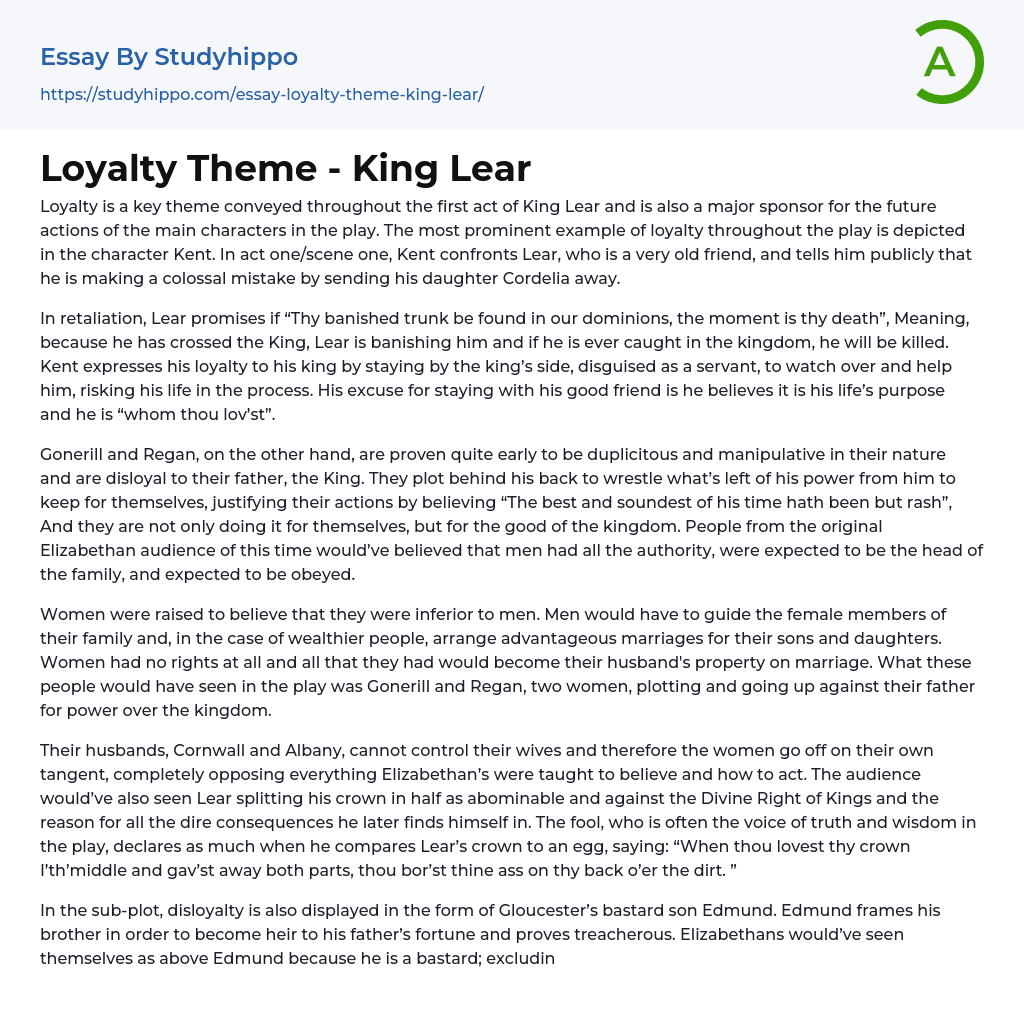Loyalty is a key theme conveyed throughout the first act of King Lear and is also a major sponsor for the future actions of the main characters in the play. The most prominent example of loyalty throughout the play is depicted in the character Kent. In act one/scene one, Kent confronts Lear, who is a very old friend, and tells him publicly that he is making a colossal mistake by sending his daughter Cordelia away.
In retaliation, Lear promises if “Thy banished trunk be found in our dominions, the moment is thy death”, Meaning, because he has crossed the King, Lear is banishing him and if he is ever caught in the kingdom, he will be killed. Kent expresses his loyalty to his king by staying by the king’s side, disguised as a serv
...ant, to watch over and help him, risking his life in the process. His excuse for staying with his good friend is he believes it is his life’s purpose and he is “whom thou lov’st”.
Gonerill and Regan, on the other hand, are proven quite early to be duplicitous and manipulative in their nature and are disloyal to their father, the King. They plot behind his back to wrestle what’s left of his power from him to keep for themselves, justifying their actions by believing “The best and soundest of his time hath been but rash”, And they are not only doing it for themselves, but for the good of the kingdom. People from the original Elizabethan audience of this time would’ve believed that men had all the authority, were expected to be the head of the family,
and expected to be obeyed.
Women were raised to believe that they were inferior to men. Men would have to guide the female members of their family and, in the case of wealthier people, arrange advantageous marriages for their sons and daughters. Women had no rights at all and all that they had would become their husband's property on marriage. What these people would have seen in the play was Gonerill and Regan, two women, plotting and going up against their father for power over the kingdom.
Their husbands, Cornwall and Albany, cannot control their wives and therefore the women go off on their own tangent, completely opposing everything Elizabethan’s were taught to believe and how to act. The audience would’ve also seen Lear splitting his crown in half as abominable and against the Divine Right of Kings and the reason for all the dire consequences he later finds himself in. The fool, who is often the voice of truth and wisdom in the play, declares as much when he compares Lear’s crown to an egg, saying: “When thou lovest thy crown I’th’middle and gav’st away both parts, thou bor’st thine ass on thy back o’er the dirt. ”
In the sub-plot, disloyalty is also displayed in the form of Gloucester’s bastard son Edmund. Edmund frames his brother in order to become heir to his father’s fortune and proves treacherous. Elizabethans would’ve seen themselves as above Edmund because he is a bastard; excluding a small minority who they themselves would’ve been bastards. The majority would’ve seen Edmund as stepping over the line into territory he had no place or right to be
in, the rest perhaps sympathising with the character.
- A Doll's House essays
- A Midsummer Night's Dream essays
- A raisin in the sun essays
- A Streetcar Named Desire essays
- An Inspector Calls essays
- Death of a salesman essays
- Everyman essays
- Fences essays
- Hamlet essays
- Hedda Gabler essays
- Iago essays
- King Lear essays
- Macbeth essays
- Much ado about nothing essays
- Oedipus Rex essays
- Oedipus The King essays
- Othello essays
- Pygmalion essays
- Romeo And Juliet essays
- Tartuffe essays
- The glass menagerie essays
- The Importance of Being Earnest essays
- The Merchant Of Venice essays
- The Taming of The Shrew essays
- Twelfth Night essays
- Waiting For Godot essays




